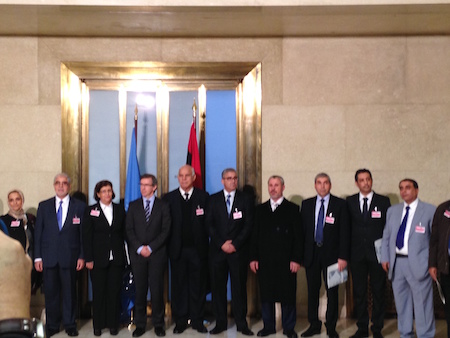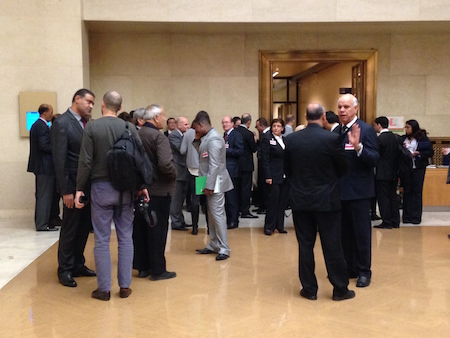By Michel Cousins.

Geneva, 14 January 2015:
The Geneva Libyan dialogue talks started today in a seemingly positive mood. Despite the absence of . . .[restrict]five members from the continuing General National Congress and threats from Libya Dawn to reject anything proposed at the three-day gathering, there were no signs of any tensions between the 19 delegates who did turn up.
None was refusing to talk to anyone else or insisting that he or she would not sit round the same table for discussions with anyone else. Around the refreshments table at the UN headquarters table today, in fact, all happily chatted away with each other as if on the same side and not House of Representatives attenders, boycotters or even the occasional member of Libya Dawn.
The only threat came slightly earlier from the head of the United Nations Support Mission in Libya (UNSMIL), Bernardino Leon. Asked at a press conference by the Libya Herald about those with guns who wanted to prevent dialogue, he said that the UN was going to get tough. “For those that want war, we’ll have no more patience,” he declared. “Their time is finished”, he said, indicating that sanctions would finally be imposed on the spoilers.
He was, however, hopeful that Congress would, when it votes on the issue on Sunday, agree to send the absent five members to Genava to join in the dialogue. Four were elected as its representatives; the fifth, Omar Abu Leefa, as an advisor/facilitator. “We hope the decision on Sunday will be positive,” he said. “The door is open” to them to join in, he said.
Fathi Bashagha, who was elected to the HoR for Misrata but who has lead the group of members who have been boycotting its sessions, took a similar upbeat line. “I think they will come,” he told this newspaper. “There is great pressure on them to do so, especially from Misrata”.
It did not make sense staying away, he added. It was far more intelligent to discuss ideas at the table than not come in the first place. “They can still refuse [to accept proposals] here,” he pointed out.
The objective was not to come up with a detailed finalised plan, Bashagha explained. What the participants were aiming at was “to agree on what could be agreed and leave aside what could not be agreed”. There was no time to waste on disagreement. “Libya needs to be stable and safe,” he said. The current crisis was too dangerous to allow it to continue.
Leon said much the same at the press conference. He pointed out that the aim of today’s gathering was to find a political solution acceptable to all Libyans, produce a government of national unity and stop the fighting. Libya, he said, was “falling very deeply into political chaos”. There was a surge of terrorist activity and now, in addition, there was serious economic and financial crisis. However, the dialogue would be “a long process”, he warned.
This week’s contributions to the dialogue process would be followed next week by those from municipal councillors and then from military commanders and tribal leaders, Leon stated. These initial gatherings would take place in Geneva but thereafter at other venues. “Some will take place in Libya or other countries,” he explained.

Stressing that the talks would respect the ideas and values of the 17 February Revolution as well as the country’s judiciary and institutions, Leon said that the role of the municipalities, as democratically-elected bodies, was crucial. He pointed out that Misrata – a “key actor” – now backed dialogue as did other municipalities that support Libya Dawn, such as Gharian and Zawia.
As to how a government of national unity would result from the talks, he said that was something that the dialogue would itself address.
He indicated, however, that he expected participants from the House of Representatives (and presumably from Congress when its members turn up) to get their colleagues to back a unity government. [/restrict]







